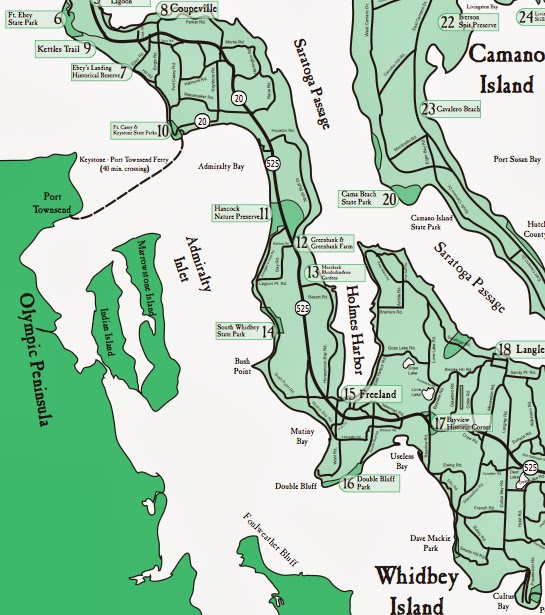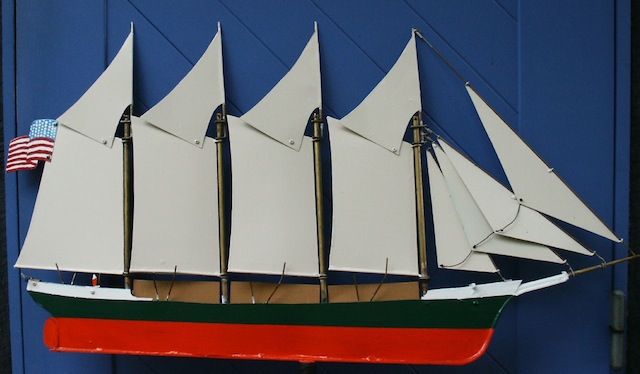By Captain James Crooks
 |
| Bush Point, Westside of Whidbey Island, WA. Click to enlarge. |
I joined the S. S. LURLINE at San Francisco, CA, early in February 1923. The LURLINE was a combination cargo and passenger vessel plying between Pacific Coast ports and the Hawaiian Islands and was operated by the Matson Navigation Co of San Fran. I shipped as quartermaster and we left for Puget Sound.
 |
| S. S. LURLINE, Matson Line, mid 1930s, arriving Hawaii. Yes, this is the gal that played on the shore of Whidbey Island, WA. Courtesy of Wikipedia. |
The engine room was located in the after end of this vessel and most of the weight, of course, being in that end, we ran well up on the beach when we grounded. The passengers felt the impact and soon they were all out on deck. The fog was so dense that we could not even see the land where we had beached.
There did not appear to be any particular damage done and soundings disclosed that the vessel was dry and no water was entering the hull.
About an hour after we grounded, the fog cleared away and passengers and crew alike, gathered on the fore part of the vessel to look around and, if possible, to ascertain where we were. As we looked at the beach we observed a very old, gray-haired man approach the bow of our vessel. He carried a small stool with him; in a slow-motion manner, carefully set it down on the shingle beach right alongside our bow which was high and dry. Questions were fired at this old man from those assembled on the bow asking him where we were but he ignored them and asked to see the captain. The captain was immediately notified and appeared on the bow high above the old man calmly sitting on his stool on the beach. It was obvious that while we were all interested, the captain was the one who was most interested in solving that question. He leaned over the bow with his scrambled-egg hat and four gold rings on his coat sleeves prominently displayed to the old man. Apparently not wishing to have both passengers and crew know that he did not know where we were, he asked the old man how far we were from Bush Point.
This old man, who apparently had at one time been a seaman, was not eager to answer questions. He said, "Well, you are the captain, I see. I have lived here for many years (in an isolated cabin which was close by) and I have had many things drift on to the beach but never before have I had an ocean liner come pretty near right into my house!" Then he asked if we had any coffee on board and when told we had plenty he said, "when you give me some coffee I will tell you just where you are".
The master stood by waiting and obviously worried while a white coated flunkey was dispatched for a pitcher of coffee which the boatswain lowered down with a heaving line and a bucket. It was not until he had a swig of coffee that the old man resumed his conversation and then he said, addressing the captain, "so you want to know how far you are from Bush Point. Well, you could not be any closer for you are right on it".
As soon as the captain definitely knew where we were, the Coast Guard was notified and a Coast Guard cutter and several towboats soon arrived and at high water attempted to pull us off the beach without success.
These vessels did not leave the vicinity after they failed to haul us off but anchored close by with the intention of making another attempt on the next high tide. That same night shortly before high water and without any warning we slipped down the beach into deep water; so suddenly did this occur that we almost drifted on top of the vessels anchored close by. The heavy current carried us free of the coast. A survey showed that there had been no damage done to the ship and we proceeded on the voyage to the Hawaiian Islands.
 |
| E. C. Kropp postcard From the archives of the S.P.H.S.© |
Text courtesy of Puget Sound Maritime Historical Society,
Seattle, WA.
By Capt. James Crooks,
Quarterly journal ,The Sea Chest. March 1974.
Bush Point ❖ ❖ Named in 1855 by the US Coast Survey because of "one or two clumps of trees and bushes."
Washington State Place Names. James W. Phillips. U of WA, 1971.





No comments:
Post a Comment